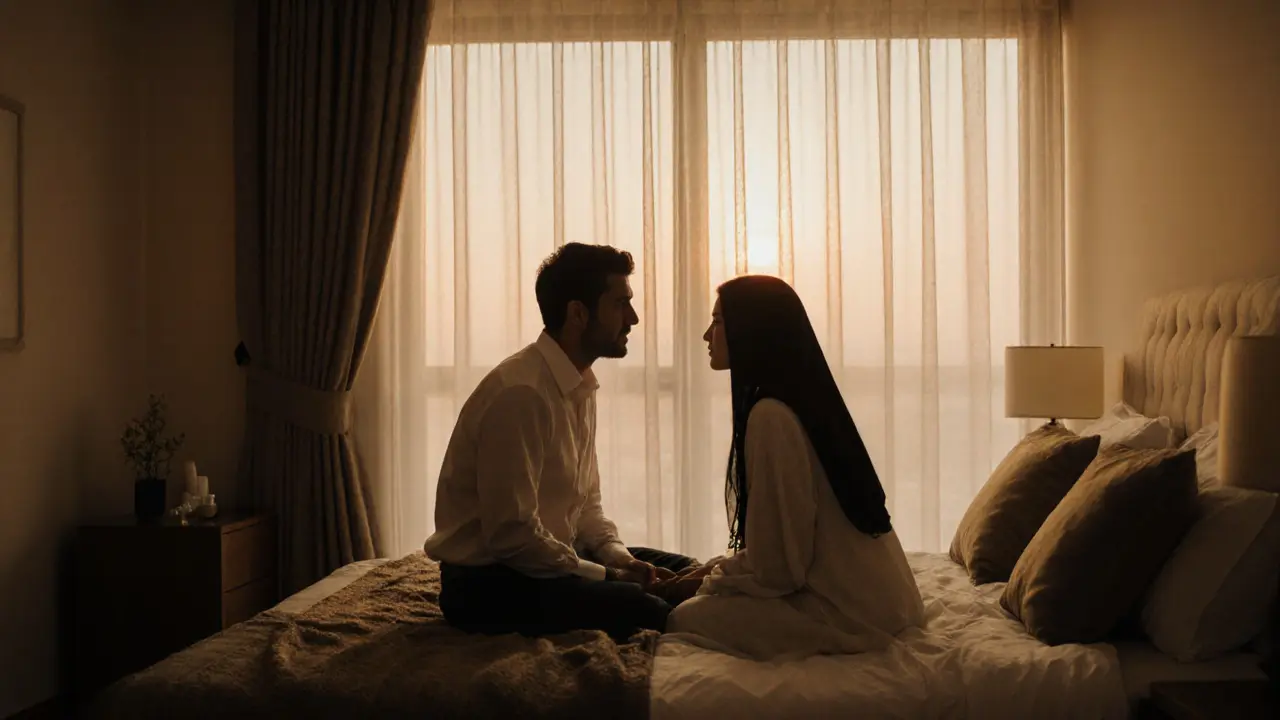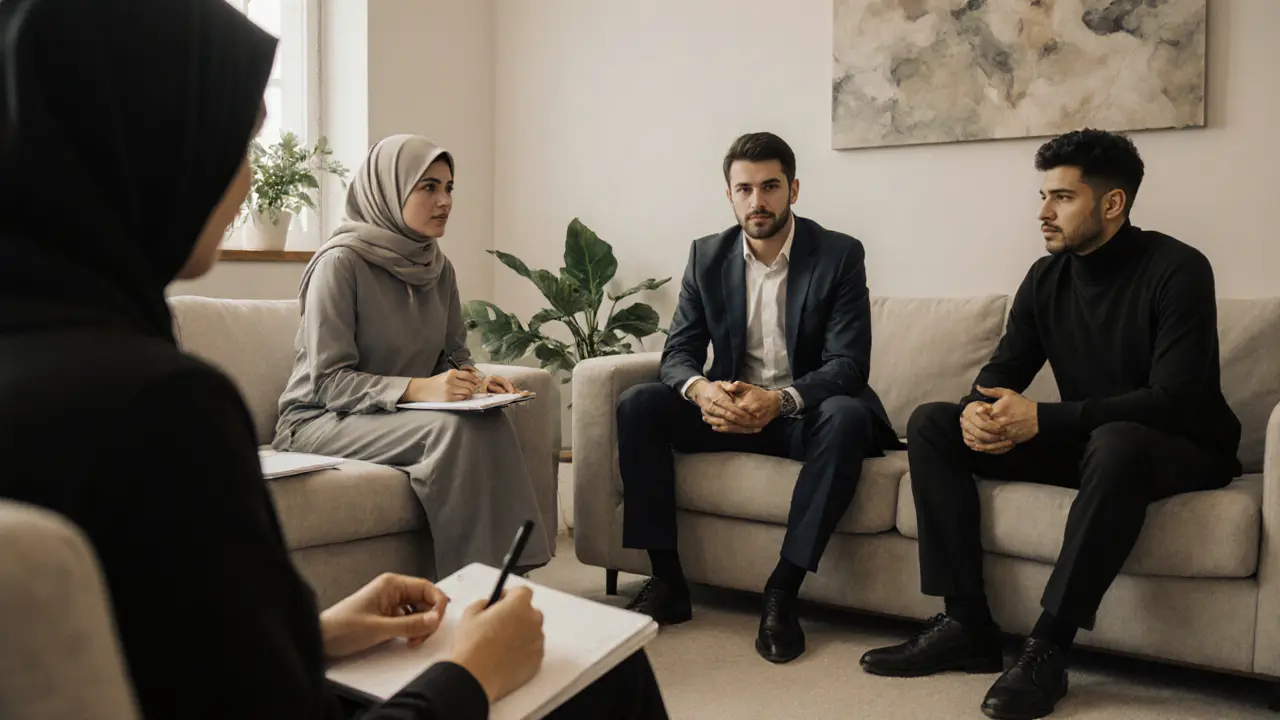
Most people think of Dubai as skyscrapers, luxury malls, and desert safaris. But behind the glitter, there’s a quieter, deeper story about how people find happiness - and for many, that includes their sex life.
A 2024 study by the Dubai Health Authority surveyed over 3,200 residents across nationalities, ages, and income levels. The results were clear: people who reported healthy, consensual sexual relationships were 47% more likely to say they felt satisfied with their overall life. Not because sex was frequent, but because it was meaningful. This isn’t about porn or escorts. It’s about connection.
What Does ‘Healthy Sex’ Even Mean in Dubai?
In a place where public displays of affection are restricted, and marriage is often the only legal framework for intimacy, the idea of ‘healthy sex’ gets complicated. But the study didn’t ask about legality. It asked about satisfaction - emotional safety, mutual desire, communication, and absence of pressure.
Among married couples, those who talked openly about needs and boundaries reported higher happiness scores than those who didn’t. Even if they had sex only once a week. Meanwhile, people who felt forced into sex - whether by cultural pressure, fear of divorce, or financial dependency - reported higher stress, anxiety, and lower life satisfaction.
One woman, a 34-year-old Filipino nurse married for eight years, told researchers: “We stopped talking about it after the first year. I thought it was normal. Then I started seeing a counselor. We didn’t fix everything. But we started saying ‘I need this’ instead of ‘I guess I’ll just deal with it.’ That changed everything.”
Marriage Isn’t the Only Path
The study included single expats, divorced individuals, and LGBTQ+ residents - all of whom face unique challenges in a conservative society. For many, sex outside marriage isn’t an option legally. But that doesn’t mean they’re not sexually active or seeking connection.
Some found intimacy through emotional bonds - deep friendships, therapy groups, or even online communities where they could speak freely. One man, a 29-year-old British engineer, said: “I can’t date openly here. But I have a therapist who helps me understand why I crave closeness. That’s my version of sex. It’s not physical, but it’s healing.”
The study found that emotional intimacy - whether tied to sex or not - was the strongest predictor of happiness. People who felt seen, heard, and safe in one relationship (romantic or platonic) were significantly happier than those who didn’t.
The Role of Culture and Shame
Dubai’s cultural norms don’t make talking about sex easy. Many grew up hearing it’s private, taboo, or even sinful. That silence doesn’t protect happiness - it kills it.
Women, especially, reported feeling guilty for wanting sex. One 41-year-old Emirati mother said: “I thought if I wanted it, I was being selfish. My husband didn’t initiate. I didn’t ask. We just lived like roommates. I didn’t realize I could feel more until I read a book on intimacy. It felt like I’d been asleep.”
Men, too, carried shame. Many feared being seen as weak if they admitted to low libido, performance anxiety, or emotional disconnect. The study found that men who sought help - whether from a doctor, counselor, or even a trusted friend - saw faster improvements in happiness than those who stayed silent.

How Dubai’s Healthcare System Is Changing
Five years ago, asking a doctor about sexual health in Dubai meant risking judgment. Now, public hospitals and private clinics offer confidential sexual wellness consultations. The Dubai Health Authority trained over 200 doctors in trauma-informed sexual counseling. Clinics now offer anonymous questionnaires and gender-neutral intake forms.
Therapists report a 68% increase in patients seeking help for sexual dissatisfaction since 2020. Most aren’t asking for pills or procedures. They’re asking: “Why do I feel so alone?” and “Can I still be happy if I don’t have sex?”
The answer, according to the data, is yes - but only if they feel emotionally connected to someone. Sex isn’t the magic ingredient. Emotional safety is.
What the Data Doesn’t Say
The study didn’t measure frequency. It didn’t rank positions or techniques. It didn’t even ask about pornography. It asked one question: “Do you feel emotionally connected to the person you’re intimate with?”
That single question predicted happiness better than income, job title, or even home size. People earning $50,000 a year with a loving partner reported higher satisfaction than those earning $200,000 with no emotional bond.
And here’s the most surprising finding: people who chose celibacy - not because they had to, but because they wanted to - were just as happy as those in active relationships. The difference wasn’t sex. It was autonomy.
Those who felt forced into sex or into silence were the least happy. Those who made conscious, personal choices - whether to be sexual or not - were the most fulfilled.

What You Can Do
You don’t need to be married. You don’t need to be sexually active. But you do need to feel safe asking for what you want - and listening when others ask for it.
- If you’re married: Try saying, “Can we talk about how we feel about each other?” - no sex talk required. Just connection.
- If you’re single: Build emotional intimacy with friends, mentors, or therapists. It’s not second-best. It’s valid.
- If you’re struggling: Seek help. Dubai has confidential counselors who won’t judge you. You can start with the Dubai Health Authority’s Wellness Line - it’s free and anonymous.
- If you’re silent: Ask yourself why. Is it fear? Shame? Tradition? Or is it truly your choice?
Happiness doesn’t come from having sex. It comes from having agency. The freedom to choose - whether to be intimate, to wait, to heal, or to walk away - is what makes life meaningful.
Final Thought
Dubai isn’t a city of repression. It’s a city of quiet resilience. People here are finding happiness in unexpected places - not in nightclubs or luxury hotels, but in honest conversations, therapy sessions, and small acts of courage.
Sex is part of that story. But only if it’s chosen. Not forced. Not hidden. Not silenced.
Is sex legal in Dubai?
Sex is legally permitted only within marriage in Dubai. Unmarried couples engaging in sexual activity can face legal consequences. However, the law is rarely enforced against private, consensual behavior between adults, especially among expatriates. The focus of recent public health efforts is on well-being, not punishment.
Can I get help for sexual problems in Dubai?
Yes. Dubai Health Authority-certified clinics and private therapists offer confidential sexual health counseling. Services include libido concerns, relationship issues, trauma recovery, and communication coaching. Many clinics offer anonymous intake forms and female-only or LGBTQ+-friendly providers. The Dubai Wellness Line (800-342) provides free, confidential support.
Do most people in Dubai have satisfying sex lives?
Not necessarily. A 2024 study found that only 38% of married residents reported high satisfaction with their sexual relationship. The biggest factor wasn’t frequency - it was emotional safety. People who felt comfortable talking about needs and boundaries were far more likely to report happiness, regardless of how often they had sex.
Is it okay to be celibate in Dubai?
Absolutely. The same study found that people who chose celibacy - not because they had to, but because they wanted to - reported levels of life satisfaction equal to those in active relationships. The key difference was autonomy. Choosing silence or abstinence freely leads to peace. Being forced into it leads to distress.
How does culture affect sex and happiness in Dubai?
Cultural norms often discourage open discussion about sex, leading to shame, silence, and unmet needs. This can damage relationships and mental health. But change is happening. More people are seeking therapy, reading about intimacy, and challenging outdated beliefs. Happiness is growing where honesty replaces silence.
If you’re in Dubai and feeling stuck, you’re not alone. The path to happiness isn’t about following rules - it’s about listening to yourself. And that’s something no law can take away.



